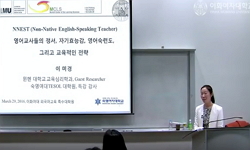This study analyzed the structural relationships among disability acceptance, self-efficacy, interpersonal relationships, and life satisfaction among individuals with physical disabilities- with a focus on examining the mediating effects of interperso...
http://chineseinput.net/에서 pinyin(병음)방식으로 중국어를 변환할 수 있습니다.
변환된 중국어를 복사하여 사용하시면 됩니다.
- 中文 을 입력하시려면 zhongwen을 입력하시고 space를누르시면됩니다.
- 北京 을 입력하시려면 beijing을 입력하시고 space를 누르시면 됩니다.

지체장애인의 장애수용, 자기효능감, 대인관계, 삶의 만족도 간 구조적 관계: 성별에 따른 다집단 분석 = The Structural Relationship Among Disability Acceptance, Self-Efficacy, Interpersonal Relationships, and Life Satisfaction of Individuals With Physical Disabilities: Multigroup Analysis by Gender
한글로보기https://www.riss.kr/link?id=A109122424
- 저자
- 발행기관
- 학술지명
- 권호사항
-
발행연도
2024
-
작성언어
-
- 주제어
-
KDC
300
-
등재정보
KCI등재
-
자료형태
학술저널
- 발행기관 URL
-
수록면
1-19(19쪽)
- DOI식별코드
- 제공처
-
0
상세조회 -
0
다운로드
부가정보
다국어 초록 (Multilingual Abstract)
This study analyzed the structural relationships among disability acceptance, self-efficacy, interpersonal relationships, and life satisfaction among individuals with physical disabilities- with a focus on examining the mediating effects of interpersonal relationships and investigating potential gender differences in these structural paths-. The participants were 1,915 people with physical disabilities. The data came from the Panel Survey of Employment for the Disabled second Wave (PESD). To investigate the relationships between variables, structural equation modeling was used and bootstrapping was utilized to verify mediating effects. Multigroup analysis was conducted to examine gender differences. It was found that disability acceptance and self-efficacy with physical disabilities were direct impacts on life satisfaction. Additionally, disability acceptance and self-efficacy influenced life satisfaction indirectly through interpersonal relationships. Second, as a result of verifying whether the structural relationship between variables differs according to gender, it was found that all paths were significant; however the difference between men and women was statistically significant in One paths. Based on these results, implications, limitations, and suggestions are discussed. This study provides valuable insights into the factors that influence life satisfaction among individuals with physical disabilities over time.
동일학술지(권/호) 다른 논문
-
ADHD 초등학생을 둔 어머니의 양육스트레스가 우울에 미치는 영향 - 부모효능감의 조절효과를 중심으로 -
- 대구대학교 특수교육재활과학연구소
- 김성범
- 2024
- KCI등재
-
유아특수교사의 직무스트레스와 직무만족도 관계에서 스트레스 대처방식의 매개효과
- 대구대학교 특수교육재활과학연구소
- 송미정 ( Song Mi-jung )
- 2024
- KCI등재
-
교육연극 활용 진로탐색 프로그램을 통한 중학교 특수학급 발달장애학생의 진로설계 변화 과정
- 대구대학교 특수교육재활과학연구소
- 옥혜숙 ( Ok Hye-sook )
- 2024
- KCI등재
-
장애학생의 공격행동에 따른 특수교사의 심리적 소진 경험 및 지원요구
- 대구대학교 특수교육재활과학연구소
- 한경인 ( Han Kyung In )
- 2024
- KCI등재




 KCI
KCI KISS
KISS






